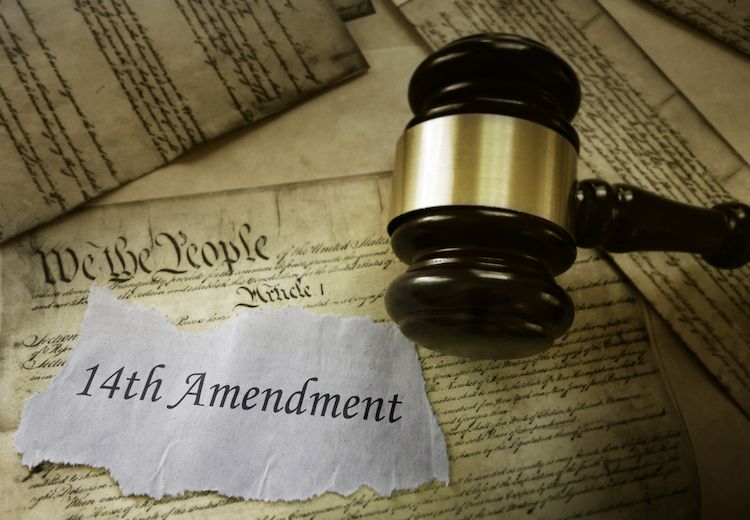Constitution bars Trump from presidency, 2 conservative law profs conclude in upcoming article

According to two conservative law professors, the case for former President Donald Trump’s disqualification from office are strong. Image from Shutterstock.
Former President Donald Trump is barred from office under the 14th Amendment because he “engaged in insurrection,” two conservative law professors have concluded in an upcoming law review article.
The professors used methods of originalism to examine the “insurrection” phrase in Section 3 of the 14th Amendment, the New York Times reports via How Appealing.
Their article will be published in the University of Pennsylvania Law Review.
Section 3 bars people who have taken an oath to support the U.S. Constitution from holding office if they “engaged in insurrection or rebellion” against the Constitution or have “given aid to the enemies” of the United States. A waiver by a supermajority of Congress can lift the ban.
Section 3 was passed after the Civil War to bar former Confederate legislators and officers from taking office. But Section 3 was not limited to the Civil War, and it remains an enforceable part of the Constitution, the article says.
The article authors are William Baude, a professor at the University of Chicago Law School, and Michael Stokes Paulsen, a professor at the University of St. Thomas School of Law.
Baude and Paulsen said the case for Trump’s disqualification from office are strong. They cited Trump’s argument that the 2020 presidential election was “stolen” and “rigged,” that he tried to intimidate state officials to alter vote counts, that he tried to persuade state legislatures and courts to overturn the election results, that he tried to assemble bogus slates of competing state electors, that he tried to pressure Congress not to count electors’ votes, and that he pressured former Vice President Mike Pence to overturn election results.
Then, on Jan. 6, 2021, Trump “delivered an incendiary address” to supporters, he reiterated claims of a stolen election, and he told the crowd to “fight like hell.” As the U.S. Capitol riot unfolded, Trump maintained silence, showing “deliberate indifference bordering on tacit encouragement,” Baude and Paulsen wrote. It took several hours before Trump directed his supporters to leave.
Baude and Paulsen make four points:
- Section 3 “is not a dead letter,” and it remains “legally operative,” despite two-thirds congressional votes to grant amnesty in 1872 and 1898. The 1872 vote, which granted amnesty to certain categories of people, used the past tense, showing that the law removed legal disqualification that was already in effect. The 1898 vote removed disqualification for everybody, but it also uses the past tense to indicate that it was removing already-incurred disqualification.
- Section 3 is “legally self-executing,” meaning that it doesn’t need legislation or a court decision to bar someone from office. The disqualification “may and should be followed and carried out by all whose duties are affected by it,” including state election officials and state and federal lawmakers.
- Section 3 supersedes prior constitutional provisions with conflicting terms, including First Amendment protections for free speech.
- The disqualification required for people who “engaged in” insurrection is sweeping, reaching Trump and others for attempting to overturn the 2020 presidential election.
Another conservative, Steven Calabresi, a professor at the Northwestern University Pritzker School of Law, noted the article and agreed with its conclusion in a post for the Volokh Conspiracy. He suggested that Republican presidential candidate and former New Jersey Gov. Chris Christie should sue to get Trump’s name off the ballot.
“Then the Supreme Court can open the dictionary and tell us what we all already know—that Trump incited an insurrection and is disqualified from being on any primary or general election ballots next year,” Calabresi wrote.
Two people who disagree with Baude and Paulsen are lawyer James Bopp Jr., who has represented members of the House of Representatives fighting allegations that Section 3 applied to them, and Michael McConnell, a professor at Stanford Law School, who wrote at the Volokh Conspiracy.
Bopp told the New York Times that Baude and Paulsen “adopted a ridiculously broad view” of Section 3, and their analysis “is completely anti-historical.”
McConnell said “insurrection” and “rebellion” connote serious uprisings to overthrow government using violence, usually on a larger scale. The terms “should not be defined down to include mere riots or civil disturbances,” McConnell wrote.
In addition, Section 3 uses the term “engage in,” which supports more than just support or assistance, McConnell said.
McConnell also warned that empowering partisan secretaries of state to disqualify opponents from the ballot is “profoundly anti-democratic.”
Write a letter to the editor, share a story tip or update, or report an error.


